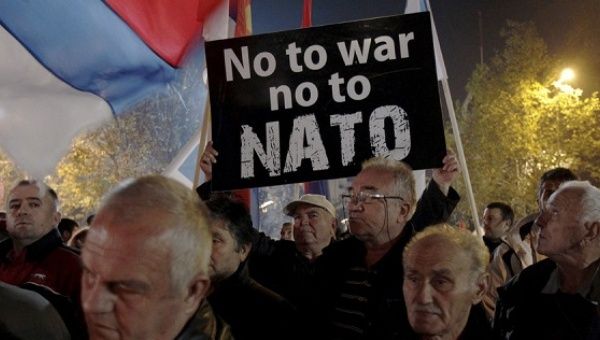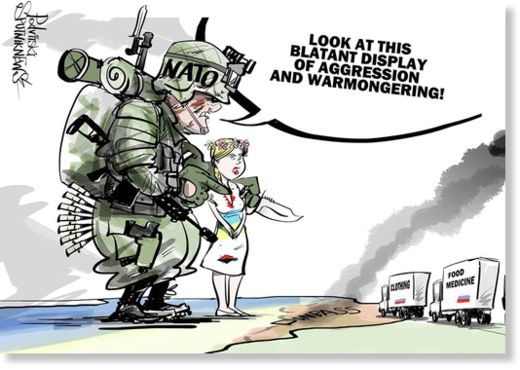
The Myth of NATO as a Defensive Alliance
Ted Galen Carpenter / The Future of Freedom Foundation
(August 31, 2023) — Western leaders have long fostered the self-serving myth that NATO is an organization solely for the mutual defense of its members. The corollary is that other nations therefore have no legitimate reason to fear the most powerful military alliance in history. After all, it is an association of peace-loving democracies.
The operational expression of the myth is most evident regarding relations with Russia. According to the dominant narrative (that a sycophantic news media obediently circulate) is that NATO’s addition of new members in Eastern Europe during the post-Cold War era posed no threat to Russia’s security.
Even the extensive efforts to turn Ukraine into an alliance military asset supposedly did not constitute dangerous provocations. Those actions included multiple weapons sales to Kyiv, the training of Ukrainian military forces, joint NATO-Ukraine war games, and apparently joint cyberwarfare operations against Russian targets.
All of these moves occurred against the background of Washington’s withdrawal from both the Intermediate-Range Nuclear Forces (INF) Treaty and the Open Skies Agreement, even though the preservation of both measures was a high priority for the Kremlin.
Despite that long pattern of belligerent behavior, Western officials continued to insist not only that Ukraine has every right under international law to join NATO, but that Moscow would have no reason to consider such a move a menace to Russia’s security.

NATO’s eastward expansion has reached Russia’s borders.
Washington is trying to foster a similar narrative with respect to policy toward the People’s Republic of China (PRC). During the last two NATO summits, much of the discussion has focused on how to deal with China. That orientation might seem a bit odd for an alliance whose official name is the North Atlantic Treaty Organization. However, the United States clearly is pushing its European allies to enlist in an increasingly hard-line policy toward Beijing. It is a transparent effort to include NATO as a player in an anti-PRC containment policy, including a willingness to help defend Taiwan.
Even if one ignores those most recent moves, the assertion that NATO is a defensive alliance is absurd. NATO conducted an air war against Bosnian Serbs in 1995 and against Serbia itself in 1999, even though neither entity had attacked or even threatened any NATO member.
The alliance similarly launched air and missile strikes against Libya in 2011 to help oust Muammar Qaddafi from power.
Even though NATO justified using military force in Afghanistan as a response to the 9-11 terrorist attacks on an alliance member, it was a great stretch of logic to justify the subsequent two-decade-long occupation of Afghanistan as a defensive mission.

In addition to NATO’s official missions that clearly were not defensive in nature, there have been other war-like actions involving some or most members of the Alliance. Both the 1991 Persian Gulf War and the 2003 Iraq War fit that description. In both conflicts, the vast majority of the anti-Iraqi forces came from NATO countries, mostly from the United States and Great Britain. Those offensive operations were Alliance missions under US control in all but name.
Most foreign governments and populations also are unlikely to believe the related mythology that NATO members are peace-loving democracies. Indeed, even the alliance’s democratic credentials have failed to live up to that standard on several occasions.
Portugal, one of NATO’s founding members in 1949, was a fascistic dictatorship. The military junta that took power in Greece in 1967 ruled that country for seven years. Turkey has maintained a democratic façade throughout most of NATO’s history, but the military and other authoritarian players have held sway most of the time. That is certainly the case with respect to the current government.
Finally, there have been the acts of flagrant aggression that individual NATO members have committed over the decades. Washington’s war in Vietnam may be the largest and best-known example, but it is hardly the only one. The US military interventions in Lebanon, the Dominican Republic, Grenada, and Panama also belong in that category.
Nor is the United States the only NATO member to engage in flagrant aggression. France has intervened in Chad and its other former colonies in Africa on several occasions. Indeed, Paris is threatening to support a new mission to overthrow the junta now ruling Niger.
Turkey invaded Cyprus in 1974 and seized nearly 40 percent of the island. Ankara’s forces routinely operate in both Iraq and Syria despite the objections of the governments in those countries.
The West’s twin propaganda images should be greeted with derisive laughter. NATO is not a purely defensive alliance, and its members are not peace-loving democracies. NATO is an aggressively offensive alliance looking for new opportunities around the world.

Ted Galen Carpenter is a policy advisor for The Future of Freedom Foundation. He is also a senior fellow at the Randolph Bourne Institute and a senior fellow at the Libertarian Institute and served in various policy positions during a 37-year career at the Cato Institute. Dr. Carpenter is the author of 13 books and more than 1,200 articles on international affairs. His latest book is Unreliable Watchdog: The News Media and US Foreign Policy (2022).
Posted in accordance with Title 17, Section 107, US Code, for noncommercial, educational purposes.